Albany, NY, November 21, 2019 - RISE 2019 brought together leaders from across the country spanning higher education, government, private and non-profit organizations to explore the role that universities and colleges play in preparedness, response and recovery to extreme weather related disasters.
During the three-day series in mid-November, the RISE 2019 conference delivered conversations and interactive panel discussions to explore how institutions of higher learning can strengthen preparedness, response and recovery efforts in the face of threats posed by a changing climate and extreme weather.
Included in the RISE 2019 program were numerous topical sessions that align with several of the New York Sea Grant and the National Sea Grant College Program 2018-2021 strategic priorities – such as using coastal communities knowledge of changing conditions and risks to prepare for and adapt to extreme weather and environmental events, economic disruptions and other threats to community well-being.
Here's a playlist of New York Sea Grant videos, most focusing on coastal resiliency, that was shared with participants at RISE 2019 ...
Also, below you will find a sampling of New York Sea Grant's extension, education and research efforts related to climate and resiliency that is the basis of fact sheet shared with RISE 2019 participants ...
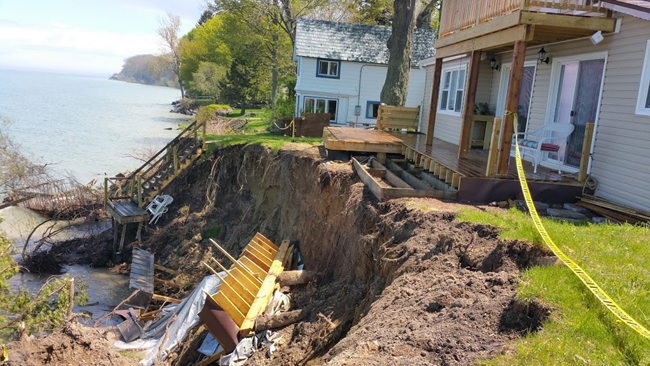
Land and yard features lost to erosion in Hamlin, NY (Monroe County). Credit: 2017 Coastal Flooding Survey Project, Cornell University and New York Sea Grant.
New York Sea Grant (NYSG) provides multiple platforms for climate and resilience extension, outreach and education along New York’s marine and Great Lakes coastlines. The nearly 50 year coastal research and extension program connects New Yorkers to climate science.
Examples include, teacher training connecting communities with experts, exploring best practices for shoreline protection and supporting local governments, as well as providing tools for communities to use to assess vulnerabilities and empower them to increase resilience.
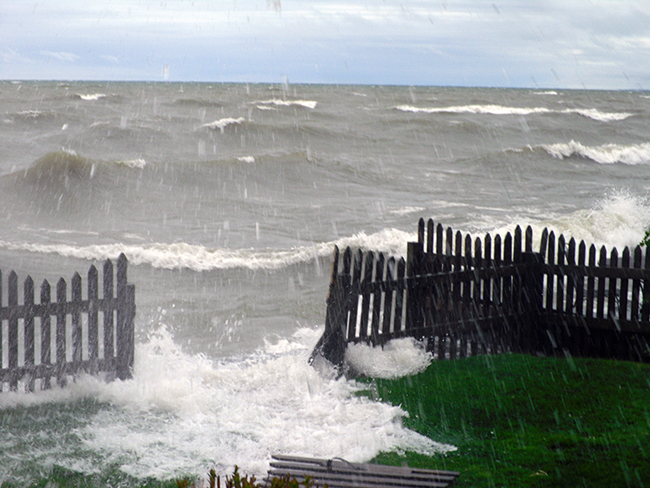
Waves driven onto yard in Rochester, NY (Monroe County). Credit: 2017 Coastal Flooding Survey Project, Cornell University and New York Sea Grant.
Documenting the Impacts of Record High Water Levels
In response to record high water levels in Lake Ontario, NYSG provided funding to Cornell University investigators to develop and implement surveys to assess the impacts of inundation and erosion on individual parcels, and collect pictures to document the event. NYSG acted as liaison between Cornell University and municipalities and property owners. In June, NYSG announced new interactive inundation mapping tools that are helping property owners along Lake Ontario and its embayments enhance flooding preparedness. In addition, NYSG is developing a story map to highlight results and pictures. More at www.seagrant.sunysb.edu/waterlevel2017.
Providing Resiliency Information to Local Communities and Property Managers
NYSG with its partners hosted multiple resiliency forums on Long Island. During these programs, community members and shoreline managers learned from experts in the field of coastal science and meteorology about the impacts of flooding and the options available to them to mitigate the effects.
NYSG, along with the South Shore Estuary Reserve, created three publications in conjunction with the Resiliency Forums. They provide property managers with options, both short- and long-term, to manage coastal flooding. The shoreline management booklet defines resilient shorelines and lists natural, nature-based, and structural options for shoreline management. Lastly, NYSG compiled separate lists, one for property owners and one for municipalities, of resources that can be helpful when determining how to increase a shoreline’s resiliency. More at www.seagrant.sunysb.edu/coastalresiliency.
NYSG, also produced “Erosion Management for New York’s Great Lakes Shorelines,” a 16-page booklet for coastal landowners. More at www.seagrant.sunysb.edu/glcoastal > Publications.
Working with Local Governments on Climate Adaptation and Green Infrastructure
NYSG with its partners is providing training opportunities for local governments that will improve the resiliency of communities to the impacts of climate change and other community stressors. A standalone, day-long event was held in Erie County (May 2017), a resiliency track was offered at the Genesee/Finger Lakes Regional Planning Council’s Local Government Workshop (November 2018), and two resiliency sessions were offered at the NYS Tug Hill Commission’s Local Government Conference (March 2018). More at www.seagrant.sunysb.edu/ccd >> Resources >> Workshops and Events.
NYSG’s Coastal Community Development Specialist, with Great Lakes Sea Grant Network and NOAA colleagues, identified the lack of a “process” for engaging coastal communities in climate adaptation planning as a major gap. NYSG is using a social science approach to address this gap and to identify climate adaptation tools and resources for customization for use in the Great Lakes. Tool customization is currently underway.
In 2016, NYSG helped establish a City of Rochester/Monroe County Green Infrastructure Collaborative that published a localized green infrastructure retrofit design and maintenance standards guidance document in 2017. The document will help local leaders address stormwater, flooding and water quality issues. The collaborative held a manual training workshop in June 2018. See the document at www.seagrant.sunysb.edu/ccd >> Resources >> Tools.
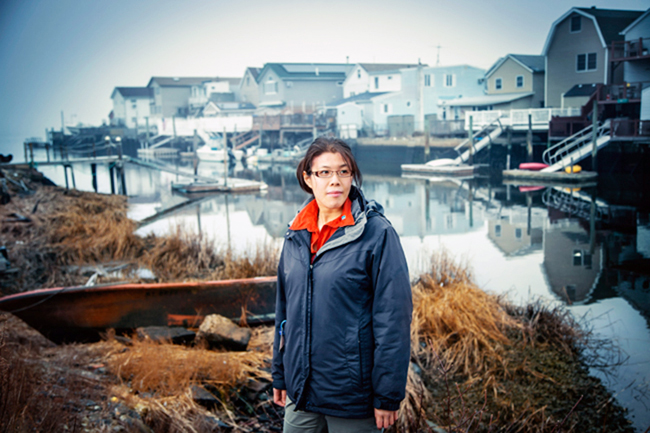
Helen Cheng, NYSG’s Jamaica Bay Coastal Resilience Specialist at SRIJB, the Science and Resilience Institute at Jamaica Bay, hosts a NYC climate forum and podcast series. Credit: Jason Koski, Cornell University Photography/Ezra Cornell University’s Magazine.
Facilitating Expert and Community Engagement on Climate
Seven years post-Sandy, the superstorm still looms in the memories of New Yorker’s, but NYSG is working with groups to help them prepare for coastal hazards and to be resilient for the next big storm.
In an effort to improve the coordination and delivery of climate, weather and preparedness-related information, a series of public events called the “Climate Forums” are being held in critically-affected sectors and coastal communities of New York City (NYC).
The series is dedicated to enhancing awareness of climate-related coastal events and providing information, resources and tools to empower communities. Since the series’ inception in late 2016, there have been five Climate Forums held in the Jamaica Bay watershed and over 200 participants from neighborhoods across the city have attended. More at www.seagrant.sunysb.edu/jamaicabay.
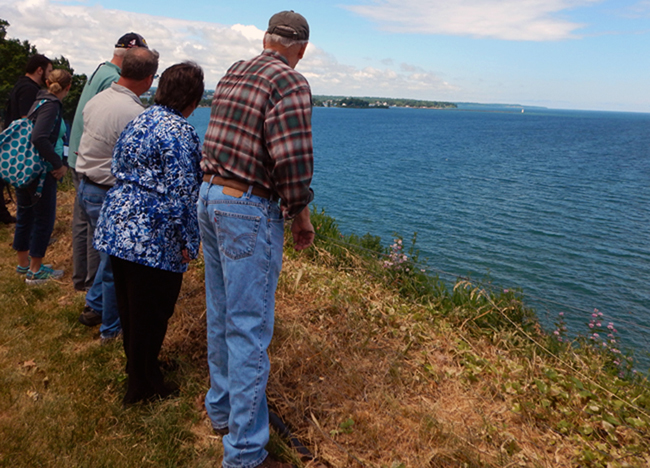
NYSG shoreline tour participants view a bluff protection and stabilization project along Lake Ontario. Credit: courtesy of Heather Weitzner, New York Sea Grant.
Monitoring Natural and Nature-Based Shoreline Features in New York State
NYSG partnered on a collaborative two-year initiative to develop and test a monitoring framework for a range of shoreline management approaches to better understand their ability to provide ecological services, mitigate storm impacts, and contribute to community well-being.
The key here was to develop monitoring protocols to track the performance of nature-based features and other non-structural and structural shoreline erosion management measures, in the context of varying New York State regional shoreline conditions.
As part of this process, NYSG gathered recommendations for monitoring through hosting regional workshops across the three out of four regions of New York State. More on this effort, which includes “living shorelines and “nature-based shorelines” in, respectively the State’s marine and Great Lakes waters, can be found at www.seagrant.sunysb.edu/nyshorelines.
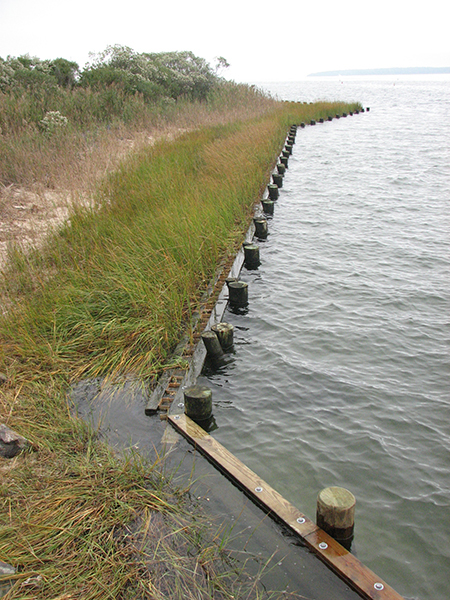
An example of a living shoreline. Credit: Jay Tanski, New York Sea Grant.
Bringing Climate Change into the Classroom
NYSG recognizes the importance of educating classroom teachers on climate science to prepare students for the ecosystem changes caused by climate change, as well as teaching their students what actions they can take to help mitigate increases in greenhouse gases and other effective responses to climate change. With Great Lakes teachers, NYSG works with university scientists and those from the National Weather Service to help deliver accurate, up-to-date science to educators.
In New York’s Hudson River Valley, Sea Grant collaborated with New York State Department of Environmental Conservation (NYSDEC) partners to create a set of nine place-based lesson plans and activities to help middle school teachers and students understand climate change close to home. More at www.seagrant.sunysb.edu/hvclimate.
These lessons inspired Sea Grant’s participation in a National Oceanic and Atmospheric Administration (NOAA)-funded climate literacy project in NYC public schools in partnership with Brooklyn College and the National Wildlife Federation. The three year Resilient Schools Consortium Project (RiSC) engages underserved middle and high school teachers and students in 12 schools in the vulnerable coastal community of South Brooklyn, hard hit by Superstorm Sandy. This curriculum will transfer to schools throughout NYC and be made available to communities across the U.S. that are likewise looking for ways to increase climate literacy in urban youth and engage youth in resiliency planning.
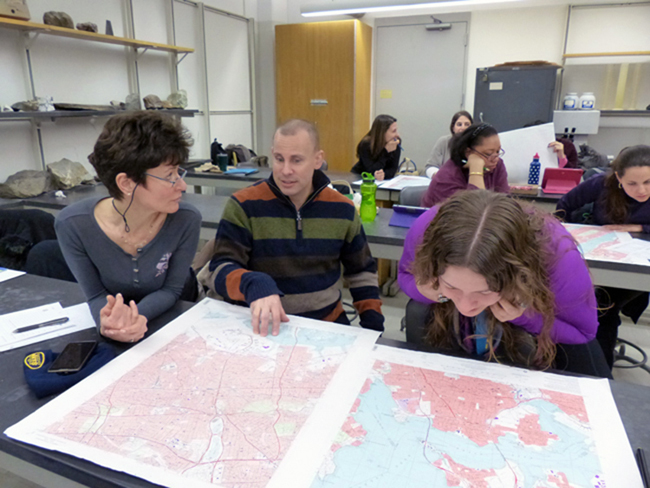
Some 100 elementary school teachers have taken part in the NOAA Environmental Literacy Grant-funded “Visualing Coastal Change” workshop series held at Queens College. Credit: courtesy of David Jakim.
Additionally, NYSG partners in another climate project launched by the Cornell-affiliated Paleontological Research Institution. “Climate to Go” is in the second phase of a crowdfunding campaign in its quest to bring climate change science to every U.S. high school. Sea Grant has conducted some workshops, during which its specialists presented coastal storm awareness research summaries and emergency preparedness go-bags teachers can share with students and families. More on RiSC and Climate-to-Go at www.seagrant.sunysb.edu/nyc >> News.
Sea Grant is also currently involved in a U.S. Department of Agriculture (USDA) National Institute of Food and Agriculture (NIFA) project exploring possible development of a Climate Master training program akin to the successful Master Gardner (MG) and Master Forester programs Cornell Cooperative Extension has facilitated for decades. In Ulster County, Sea Grant integrates climate change education in the Ulster MG program, based at the county’s water wise garden at State University of New York (SUNY) Ulster.
Supporting Climate Change Research
NYSG has supported a variety of climate change research projects over the years. These studies have covered topics ranging from improving storm surge modeling used for flood prediction, to the impacts of sea level rise on coastal habitats and how climate change impacts coastal communities and natural marine populations. More at www.seagrant.sunysb.edu/research, www.seagrant.sunysb.edu/climate.
More Info: New York Sea Grant
New York Sea Grant (NYSG), a cooperative program of Cornell University
and the State University of New York (SUNY), is one of 33 university-based
programs under the National Oceanic and Atmospheric Administration’s
National Sea Grant College Program.
Since 1971, NYSG has represented a statewide network of integrated
research, education and extension services promoting coastal community
economic vitality, environmental sustainability and citizen awareness
and understanding about the State’s marine and Great Lakes resources.
Through NYSG’s efforts, the combined talents of university scientists
and extension specialists help develop and transfer science-based
information to many coastal user groups—businesses and industries,
federal, state and local government decision-makers and agency managers,
educators, the media and the interested public.
The program maintains Great Lakes offices at Cornell University, SUNY
Buffalo, SUNY Oswego and the Wayne County Cooperative Extension office
in Newark. In the State's marine waters, NYSG has offices at Stony Brook
University in Long Island, Brooklyn College and Cornell Cooperative
Extension in NYC and Kingston in the Hudson Valley.
For updates on Sea Grant activities: www.nyseagrant.org has RSS, Facebook, Twitter, and YouTube links. NYSG offers a free e-list sign up via www.nyseagrant.org/nycoastlines for its flagship publication, NY Coastlines/Currents, which is published quarterly. Our program also produces an occasional e-newsletter,"NOAA Sea Grant's Social Media Review," via its blog, www.nyseagrant.org/blog.